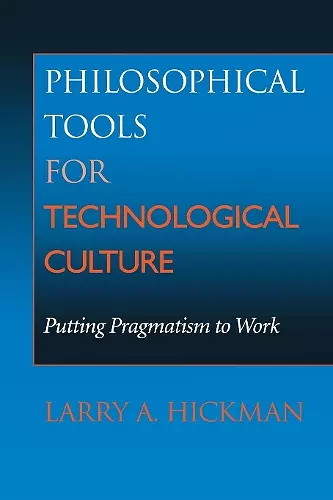Philosophical Tools for Technological Culture
Putting Pragmatism to Work
Format:Paperback
Publisher:Indiana University Press
Published:22nd Feb '01
Currently unavailable, and unfortunately no date known when it will be back

"Hickman['s] . . . style of pragmatism provides us with flexible, philosophical 'tools'
which can be used to analyze and penetrate various technology and technological
cultural problems of the present. He, himself, uses this toolkit to make his analyses
and succeeds very well indeed." —Don Ihde
A practical and comprehensive appraisal of the value of philosophy in today's technological culture.
Philosophical Tools for Technological Culture contends that technology—a defining mark of contemporary culture—should be a legitimate concern of philosophers. Larry A. Hickman contests the perception that philosophy is little more than a narrow academic discipline and that philosophical discourse is merely redescription of the ancient past. Drawing inspiration from John Dewey, one of America's greatest public philosophers, Hickman validates the role of philosophers as cultural critics and reformers in the broadest sense. Hickman situates Dewey's critique of technological culture within the debates of 20th-century Western philosophy by engaging the work of Richard Rorty, Albert Borgmann, Jacques Ellul, Walter Benjamin, Jürgen Habermas, and Martin Heidegger, among others. Pushing beyond their philosophical concerns, Hickman designs and assembles a set of philosophical tools to cope with technological culture in a new century. His pragmatic treatment of current themes—such as technology and its relationship to the arts, technosciences and technocrats, the role of the media in education, and the meaning of democracy and community life in an age dominated by technology—reveals that philosophy possesses powerful tools for cultural renewal. This original, timely, and accessible work will be of interest to readers seeking a deeper understanding of the meanings and consequences of technology in today's world.
Hickman offers a refinement of his earlier John Dewey's Pragmatic Technology (CH, Jun'90), with nine essays inviting consideration of some of the pivotal problems and prospects of our technological culture. The essays are concerned with the paradoxical fact that the techniques and technologies ostensibly developed as means of control are now viewed by many individuals as spinning out of control, or at the very least, as operating beyond their personal control. The author argues that not only is technology as culture the legitimate concern of philosophers, but that they can be cultural critics and reformers in the process. One of the most interesting chapters is devoted to ways in which a techno-scientific education might serve to confront antiscientific elements in modern society, including religious fundamentalism (Islamic as well as Christian) and the splintering effects of contemporary specialism. The author contrasts Dewey's own critique of technological culture with those of Jacques Ellul and Martin Heidegger. In the closing chapter he also provides his own program for the effective reform of technological culture. He puts philosophy to work so that productive pragmatism may transform technocracy to improve the present and enhance the potential for future growth of individuals and communities alike. Upper-division undergraduates through professionals; two—year technical program students.November 2001
-- J. W. Dauben * CUNY Herbert H. Lehman ColleISBN: 9780253214447
Dimensions: unknown
Weight: unknown
232 pages